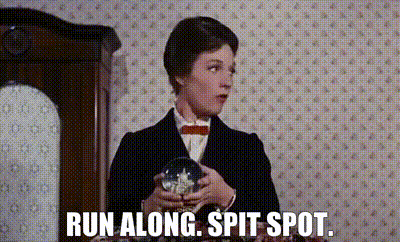In Praise of Nanny G.O.A.Ts
Almost sixty years ago, the Mary Poppins (Greatest Of All Time?) movie defined “the perfect nanny” as having:
“… a cheery disposition/ Rosy cheeks, no warts/ Play games, all sorts, You must be kind, you must be witty/ Very sweet and fairly pretty, Take us on outings, give us treats/ Sing songs, bring sweets, Never be cross or cruel/ Never give us Castor oil or gruel. Love us as a son and daughter/ And never smell of barley water, If you won't scold and dominate us/ We will never give you cause to hate us.”
Back in the present day, luckily we have workplace standards and employment discrimination legislation to prevent advertisements requiring attractiveness and stipulating complexion and fragrance terms(!) In the recent movie, Mary Poppins Returns, there’s more progressive parenting in evidence, but a good proportion of the expectations of nannies prevail. The ideal nanny is generous, entertaining, and loving, with unending patience and tolerance. Mary again achieves harmony in the family — but only thanks to magic.
Thinly-veiled threats lurked in the Banks children’s brief: your working conditions will rapidly decline if you express frustration, assert authority or implement discipline; we expect unconditional love but you shall remain on the outside.
For many parents today, paid professional childcare is essential for them to manage their responsibilities and they embrace nannies into the family with warmth. Unfortunately, the job title can still carry outdated ‘baggage’. Some Playhood members have been discussing the various waves of social media controversy have come and gone on this topic, with the idea of “nanny-shaming” confusingly meaning either calling out nannies for their actions OR calling out employers of nannies for obscuring the credit owed to them. Both kinds of outcry are fuelled by a vocal few unfairly and unnecessarily judging parents for not being with their children 24/7.
The now closed Children's Workforce Development Council ran a survey back in 2009 that noted how hard it was to quantify the number of nannies in the UK, given how casual and often unregistered or regulated this part of the childcare sector is. The vast majority of those surveyed felt undervalued and that the profession wasn’t held in sufficient regard by the general public. Perhaps it’s the title ‘nanny’ that sounds a little too ‘Norland’ or perhaps we need to applaud and celebrate our wonderful nannies more often and more visibly…
Consensus here is that how much help (and what kind of support you need, and when, and from whom) are entirely personal decisions, very specific to each family! Like with so much in the early years, positive partnership is everything.
A nanny can mean a few hours help a week or someone who also goes on holiday with the family; it can mean someone who focuses only on the children or who helps out with cooking and laundry and so on; it can be a short-term position at a particular time of need or a loyal post for many years. We agreed that boundaries and expectations were key to establish up front.
Further reflections from our community:
childcare (like baby feeding, actually!) is usually a patchwork or hybrid set-up, and not a clean and simple fact, so jumping to conclusions about people’s decisions is unwise
choosing to invest when we could in an experienced one-on-one caregiver was what made me feel extra confident about returning to work after the baby arrived
family support is usually unpaid, but often comes with other strings/limitations
the idea of nannies carries historical and cultural baggage to navigate - it makes some think of posh families in Victorian times/Chelsea, a mixture of governesses and wet nurses
strong relationships with trusted adults are positive in children’s early lives; nannies really can be valuable additions to the family, offering support and advice from their experience, it should never be about competition or comparison, or feeling like you have to “manage” them
getting to know their about interests and passions, and supporting and encouraging these, helps empower them to bring their strengths out when working with your children
a nanny can be more a part of the “team” (or “village” perhaps) around the child when they interact with the nursery staff, and understand the experiences the child is having both at home and in the setting
In our community at Playhood, several nannies have been recommended by personal recommendation and worked for a series of families here; they stay local and loyal because they’re deeply respected and trusted, starting with being welcomed into a family with openness — and being fairly compensated and cared for too. Celebrating their birthdays and including them in family events. Getting to know their family as they get to know yours. These are the sorts of things that help nannies become precious friends, long after their employment ends.
Just as our model here evidences the benefits of blurring traditional lines between roles like parent and educator, we hope to also continue to foster these positive human connection in our wider community too.



